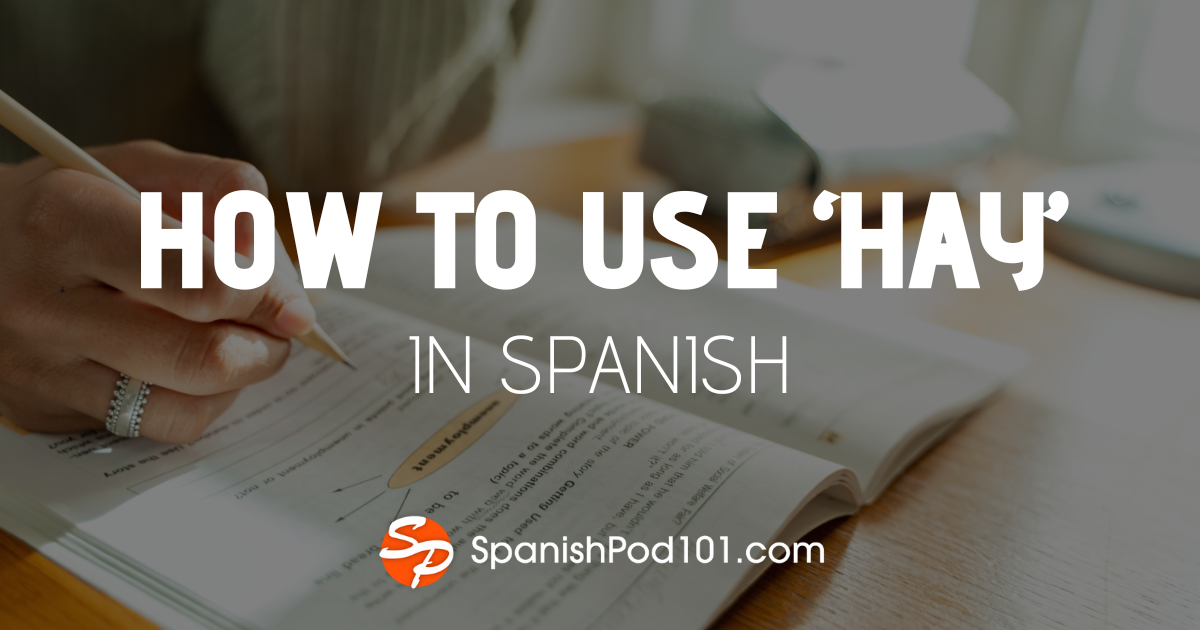Archive for the 'Spanish Grammar' Category
November 13, 2025
Understanding the Spanish Word “Hay”
One of the most common Spanish words you'll encounter is "hay." This little word appears everywhere in conversation and prompts many beginners to ask: "what does hay mean in Spanish?"
In short, hay in Spanish means "there is" or "there are". An essential term in everyday Spanish, used to express the existence or presence of something. In this article, we'll explore the meaning of hay, its conjugations, and when to use hay instead of other words.
What Does "Hay" Mean in Spanish?
In Spanish, hay is an impersonal verb form that indicates existence. Hay comes from the verb haber, and is used only in the third person singular (it doesn't change with plural). The meaning of hay in Spanish is "there is" (for singular things) or "there... Show more
December 16, 2021
The Advanced Spanish Words You Definitely Need
Speaking Spanish in casual conversations is a rewarding experience. Sure, native Spanish speakers converse at a really fast pace. But, if you ask them to slow down, they will—and they will probably try to help you understand and be part of the conversation.
At the end of the day, there’s a reason why Spanish-speaking countries are said to have some of the friendliest people!
But what happens when, instead of an informal chat over some wine and tapas, you have to face a doctor’s appointment or a super important business meeting? Formal situations will call for advanced Spanish words, which might be scary for those who are still learning.
Namely, you’ll have to step up your game in order to succeed in conversations related to higher... Show more
August 10, 2021
Master the Art of Saying No with Negatives in Spanish
Saying no in Spanish might sound quite easy, especially considering that the word "no" is used in both Spanish and English. However, there are some tricks and rules you’ll need to learn in order to master this important aspect of day-to-day conversations. The good news is that once you have these rules down, you’ll be able to make negative commands in Spanish, politely decline something, or answer a question in the negative.
You should know that there are some grammar rules in English that don’t quite apply in Spanish. For starters, the use of double negatives—which is a grammatical error in English—is considered correct in Spanish and is very common. The usage of plural nouns is different as well, and of course, exact phrases and... Show more
July 8, 2021
The Ultimate Guide to Spanish Tenses
One of the most daunting things when learning a new language, especially if that language is Spanish, is trying to master the verb tenses and conjugations. Spanish conjugation rules are quite different from those of English, and it might seem to you that there are too many Spanish tenses and endless exceptions. It might feel like a very long journey to embark on.
But don’t fear!
Spanish is a complex language, and yes, there are numerous tenses to master. Nevertheless, there are numerous tricks and rules to make it all a lot easier. It’s all about learning patterns and practice, practice, practice.
We want to help you out on your mission to become an expert in Spanish verb tenses. Because it’s our goal to make the... Show more
June 25, 2021
How Long Does it Take to Learn Spanish?
At some point, every Spanish learner has asked the question: How long does it take to learn Spanish? And there’s no easy answer! It depends on many factors, such as your commitment and available resources. The total amount of time it takes you to reach a certain level of fluency may vary significantly from that of another learner.
But don’t get discouraged! Beginning your Spanish language learning journey now will be well worth it. Spanish is the second most spoken language in the world (second only to Mandarin), and is growing in use every day. In addition to reaping the benefits of knowing such a widely spoken language, this journey will help you get closer to the wonderful Spanish culture and give you the confidence needed to travel... Show more
June 10, 2021
The Top 30 Essential Spanish Proverbs
Proverbs are an essential part of popular and oral culture. Often transmitted to children by the elder generations, they are language’s time capsules that carry a lot of history—and unique cultural perspective—with them.
Because proverbs from around the world have very different origins and have evolved from their original meanings over time, they can be difficult to understand without context or a good guide in hand.
Fortunately, we’ve got you covered! SpanishPod101 brings you the top thirty Spanish proverbs and sayings that will help you speak like a local (or at least understand why Spaniards say that the world is a handkerchief).
Ready? Then let’s get started.
From that stick, that chip or like mother, like daughter!
... Show more
March 25, 2021
Variety in Spanish: Understanding the Differences
If you’re reading this, it’s because you already know how important and useful it is to learn the Spanish language. There are about 405-million native speakers, and there are even more people who speak Spanish as a second language for business, education, or love.
Why?
Well, Spanish is the official language in twenty countries: Argentina, Bolivia, Chile, Colombia, Costa Rica, Cuba, Dominican Republic, Ecuador, El Salvador, Equatorial Guinea, Guatemala, Honduras, Mexico, Nicaragua, Panama, Paraguay, Peru, Spain, Uruguay, and Venezuela.
Because the language is spoken in so many countries, there are quite a few Spanish dialects and varieties out there!
Table of Contents
Can Spanish People and Latin Americans Understand... Show more
March 18, 2021
A Quick Overview of Spanish Grammar
As you know, grammar is an important part of any language, and Spanish is no exception. Spanish grammar has many similarities with other Romance languages, including many features that are comparable to English.
In this article, we're going to briefly explain the basics of Spanish grammar. We’ll also provide links to other articles and lessons on our website, where you’ll be able to find more detailed information on crucial Spanish grammar topics. In addition, we’ll explain some of the differences and similarities between the grammar rules of Spanish and English.
Table of Contents
General Rules
Verbs
Nouns
Adjectives
Negation
How SpanishPod101.com Can Help You Master Spanish
1. General Rules
To begin, we’ll... Show more
January 18, 2021
All About the Subjunctive Spanish Mood
Do you know the names of all the verbal moods and tenses in English (or in your native language)? You might know a few, you might know all of them, or you might not even be familiar with any of them. Knowing the names isn’t so important, unless you’re a huge fan of grammar or you study something related to linguistics. But, even if you don’t know all these names, you know how to use them, don’t you? Otherwise you wouldn’t make much sense in your native language.
We’re going to teach you everything you need to know about the subjunctive Spanish mood and all its tenses, which is going to be incredibly helpful for your Spanish.
This is what’s important: not what we call them—even though it’s still helpful when learning them—but knowing... Show more
December 18, 2020
Is Spanish Hard to Learn, and Should You Start Learning?
There are many reasons why you should learn Spanish, and truth be told, everyone who’s looking to learn has their own special reason. Some learners might want to move to a Spanish-speaking country, while others might have a Spanish-speaking significant other. Some learners might just like the language, while others think that it’s a useful language to learn. And it is! In fact, Spanish is one of the most useful languages to learn in the world.
But is Spanish hard to learn, as well?
Well, it has the second-largest number of native speakers (after Mandarin Chinese) and it’s the fourth most-spoken language overall. Anyone who’s able to speak at least two of the most-spoken languages in the world already has a huge advantage compared... Show more









